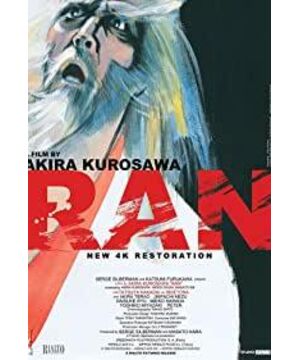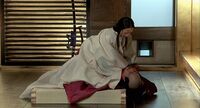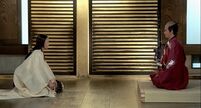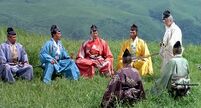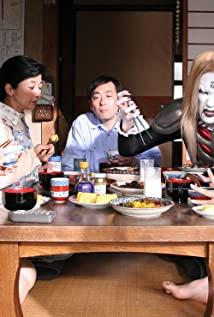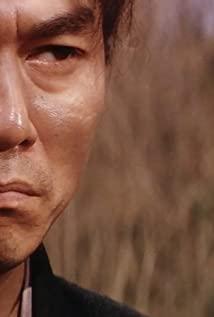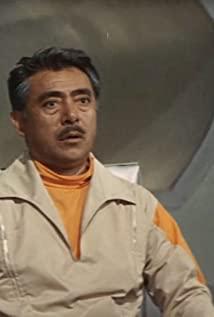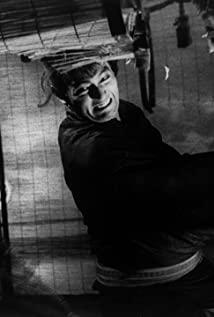The story structure of the film uses Shakespeare's famous tragedy "King Lear". According to Japanese history and culture, the combination of East and West shows a worldwide appeal. I think this is also an important reason for the film's popularity. Kurosawa is good at telling stories. Although "King Lear" itself is a rich enough story, the same story is often told by different people with different effects, not to mention that the director just borrowed a shell and has more content. It is his own thinking. Because of this, although many of Kurosawa's films are relatively long, they can always be watched patiently. This effort is really not easy. Many directors have penetrated his thoughts in the films. However, due to the lack of storytelling of the film, the film can only become an academic film, and his thoughts cannot influence more people.
The structure of the story is very simple. The old Xiao Xiuhu wants to divide the territory between his three sons, hoping that they will work together to continue the family's great cause. But things went counterproductive. This led to the division of the family. The younger son was expelled, while Xiuhu was not tolerated by the two sons. The eldest son and the second son deceived each other, and eventually the family declined during the split. In the film, Xiuhu is a complicated character. He was full of hope for the children when he was old, hoping that they could unite as one, but the result made him heartache, from the time when Xiuhu was separated from power and hoped to spend his old age in peace and was expelled by his sons. The speed of progress is staggering. Xiuhu instantly changed from a king to a "poor man" that his sons can easily manipulate. At this moment, I can't help but ask why? As the film progresses, the answer becomes clear. In fact, the children are doing what Xiuhu once did. The old man once gained the status of a hero by virtue of his cruelty and ruthlessness. Therefore, when he becomes a role model for the children by unscrupulous means, it is only wishful thinking that he tries to make the children benevolent, righteous, loyal and filial. The film reveals a fatalistic color from the fate of Xiuhu. Xiuhu became ruthless and ruthless. Finally, with the ruthlessly forged territory, he became a ruthless territory and was destroyed in the ruthless war. The fate of the Xiuhu family shows strong oriental characteristics. Such stories have happened too much in Japan or in China. The distortion of human nature caused by the struggle for rights exerts great lethality, and at the same time shows great vitality. "Stubborn survival in history has allowed tragedies to continue.
In the film, Mr. Feng Jun, the wife of Xiuhu's eldest son, is an important character. She fully expresses the trajectory of people's thoughts in a turbulent age and a distorted environment. She was the daughter of a prince, but her family was destroyed by Xiuhu. From her narrative, it must be a cruel process, and it's no wonder that a flame of revenge lurks in her heart. In hatred, she showed amazing calmness in madness, and she also learned the essence of unscrupulous methods from Xiuhu, so after entering the castle of the former family, she wanted to instigate her husband to push her enemy Xiuhu into desperation; therefore, her husband Taro died. Later, she went on to seduce her husband's younger brother Jiro; therefore, she must urge Jiro to assassinate Saburo and at the same time start a war of vassals to destroy the family that once destroyed her family. As she said at the end of her life, she wants to burn down this former family castle, a kind of decisive hatred like jade and stone is terrifying. At first, the audience might have thoughts such as “the most poisonous but not the heart of a woman” and that a woman has misunderstood her country, but it is not difficult for us to understand her choice when we carefully understand her fate. In times of war, women’s fate is often not chosen by them. Either they swallowed their hatred like the original wife of Erlang, and dispelled their hatred into the sustenance of religion; or, like Feng Jun, went to another extreme unscrupulous revenge, and at the same time bore the infamy of later generations, which has nothing to do with her, she succeeded , She witnessed the demise of the enemy's family and died tragically.
Although the story of the Xiuhu family in the film is fictional, the story is always true, the struggle for power, the rise and fall of the family, the fate of women, the story of revenge, and the fight on the battlefield are all reflections of the real world. There are no heroes in the film, no Wallace who shouted "freedom" before he died, only the naked power struggle out of human nature. Everyone in the film has a pitiful side, and everyone seems to be innocent. Their tragic fate It seems to be the inevitable cause and effect, maybe only the clown beside Xiuhu is innocent. Kurosawa created a tragic effect brilliantly. The despair of the soldiers on the battlefield, the sad music, and the heavy colors all revealed a shocking effect. At the same time, what impressed me deeply was the color of the costumes of the characters. For example, the colors of the soldiers on all sides were very strong, even if they were white, they were very dazzling. The soldiers were fighting in the dark castle under the heavy attire. At that time, the tragic effect is very obvious. Yes, strong and gorgeous colors always give people a great visual stimulation, which is especially suitable for creating atmosphere, just like many characters in the film always die under gorgeous costumes or bold armor. It is even more heartbreaking.
Kurosawa's later films are more permeated with thinking and humanistic spirit, just like in this "Chaos", he reveals human nature and ponders heavily. At the end of the film, only a blind descendant of the family who was killed by Xiuhu survived. He was "harmless", he was ordinary, so he survived. The fictional era in "Chaos" is a turbulent era. The film is always filled with "chaos", chaotic battlefields, chaotic ethics, chaotic families, and chaotic human nature. In chaos, a seemingly powerful family walks. Entering the tomb, what is left are the ruins of castles.
http://handsomewang.blogdriver.com/handsomewang/1140502.html
View more about Ran reviews


